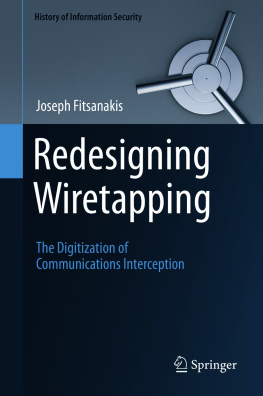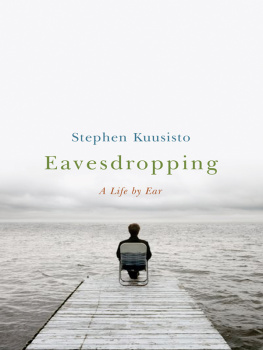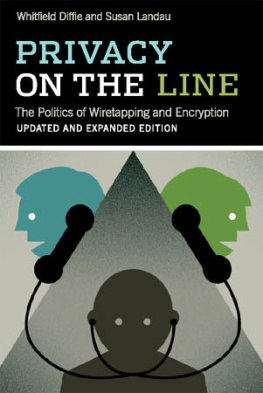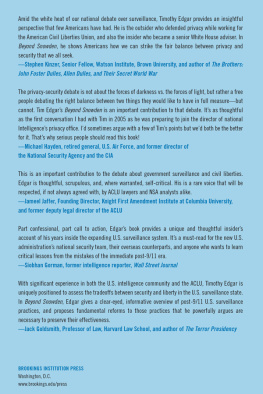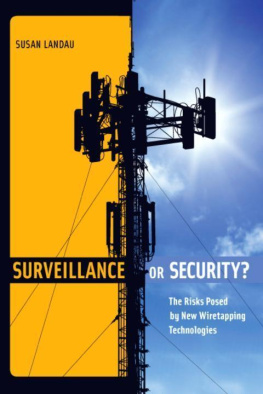Contents
Guide
Pagebreaks of the print version
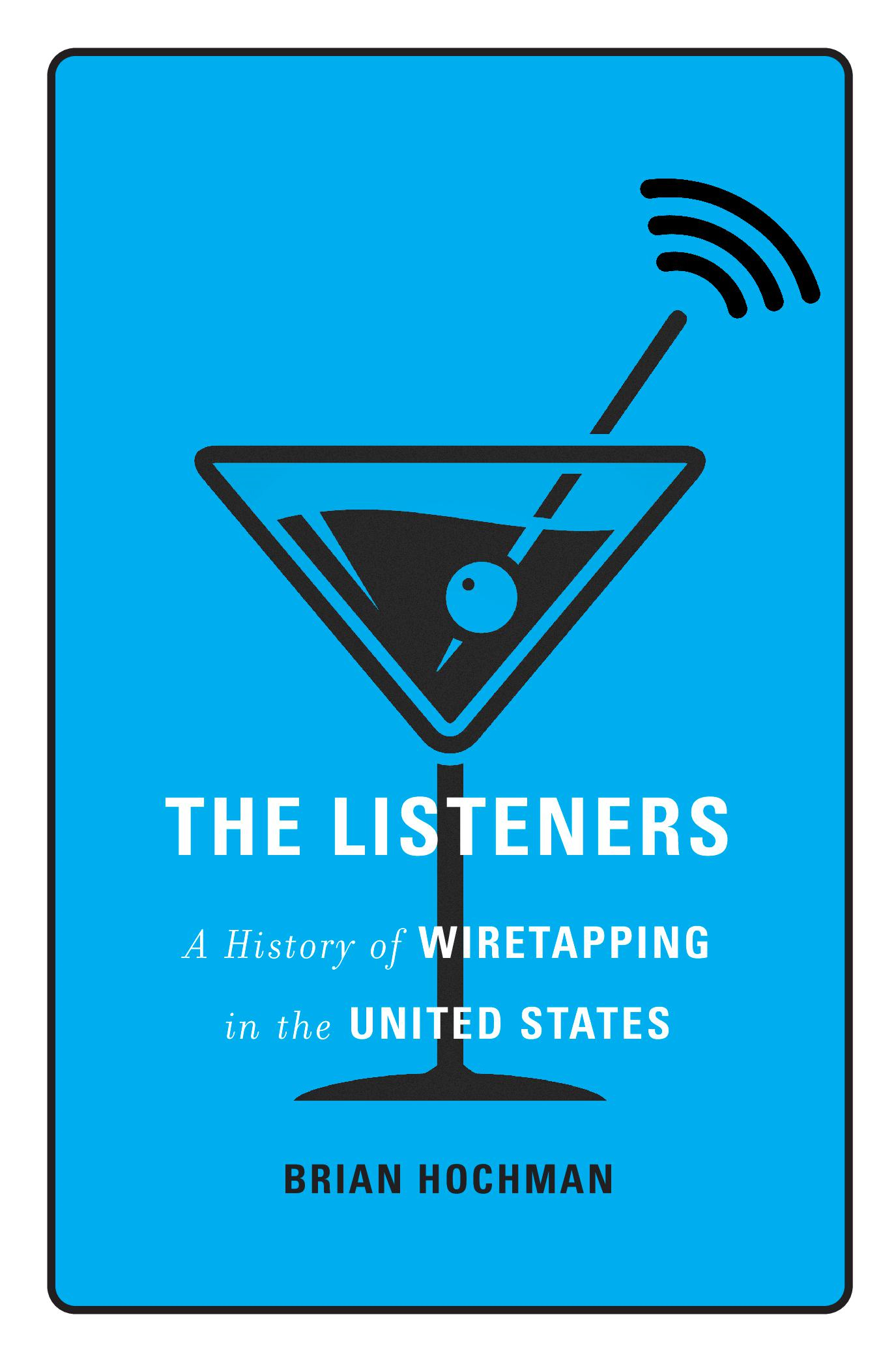
THE LISTENERS
A History of WIRETAPPING in the UNITED STATES

BRIAN HOCHMAN

Cambridge, Massachusetts
London, England
2022
Copyright 2022 by the President and Fellows of Harvard College
All rights reserved
Cover design by Jill Breitbarth
Cover image courtesy of Getty Images
978-0-674-24928-8 (hardcover)
978-0-674-27573-7 (EPUB)
978-0-674-27572-0 (PDF)
The Library of Congress has cataloged the printed edition as follows:
Names: Hochman, Brian, 1980 author.
Title: The listeners : a history of wiretapping in the United States / Brian Hochman.
Description: Cambridge, Massachusetts : Harvard University Press, 2022. | Includes bibliographical references and index.
Identifiers: LCCN 2021032833
Subjects: LCSH: WiretappingUnited StatesHistory. | Electronic surveillanceUnited StatesHistory.
Classification: LCC HV7936.T4 H63 2022 | DDC 363.25/2dc23
LC record available at https://lccn.loc.gov/2021032833
To Lena:
I love you.
CONTENTS
 D. C. WILLIAMS WORKED THE TRADING DESK at a small investment firm in Placerville, California, about forty-five miles east of Sacramento. He spent his days doing what most everyone in the financial sector does for a living. He studied trends and he made deals. He bought low and he sold high. He kept a close eye, all the while, on the regular movements of the market.
D. C. WILLIAMS WORKED THE TRADING DESK at a small investment firm in Placerville, California, about forty-five miles east of Sacramento. He spent his days doing what most everyone in the financial sector does for a living. He studied trends and he made deals. He bought low and he sold high. He kept a close eye, all the while, on the regular movements of the market.
Williams also had a knack for electronics, and his specialized technical skills helped him pick up a second job that involved wiretapping. For this job, Williams sometimes went by the names H. Franklin or D. C. Hannahs. It depended on what sort of work was required. Over the span of a short few months, Williams gained notoriety across the state of California by devising a scheme that allowed him to do both jobstrading stocks and tapping wiresat the same time. It made him a wealthy man.
The scheme was as effective as it was clever. Williams would tap into the communications of manufacturing firms and mining companies in Sacramento and nearby San Francisco, hoping to intercept news of a price quote, a patent application, or an impending saleanything that a corporate entity would consider confidential. Williams would then relay the news to a syndicate of stockbrokers posted in locations as far-flung as New York and Virginia. The brokers made financial moves based on the intercepted information, returning a cut of the profits to Placerville.
The genius of the scheme wasnt simply that it allowed Williams to eavesdrop on privileged communications. It also capitalized on the time it takes to send an electronic signal across a region as vast as that of the continental United Statesa short period of time, but a period of time nonetheless. After bribing a few well-connected officials, Williams found a way to transmit the contents of his wiretaps while slowing the speed with which the original corporate messages reached their intended destinations. His brokers could buy and sell stocks moments before anyone else, taking advantage of illegal tips while appearing to go along with the rhythms of the market.
The arrangement proved lucrative. Williamss correspondence, later produced as evidence in court, revealed that the members of his syndicate had made a small fortune while the wiretapping scam was up and running. But everything came crashing down when an anonymous tip put the authorities onto Williamss trail. After a brief investigation, detectives in Placerville arrested Williams in the act of tapping the corporate network. He was soon tried, convicted, and sent to prison under an obscure California statute prohibiting the interception of electronic messages. Reporters covering the case pronounced it a new chapter in crime, a reminder that advances in communications almost always produce advances in eavesdropping.
The yearand heres the twist to the storywas 1864.
D. C. Williams was the first American ever jailed for tapping a wire.
I first stumbled onto D. C. Williamss case while putting the finishing touches on another research project. His story was buried in the columns of a nineteenth-century newspaper. Reading the account induced a curious sort of historical vertigo. Williams had been tapping telegraph messages, not telephone calls or digital conversations. The obscure California statute under which he was prosecuted was written in 1862. That means wiretapping was enough of a concern for the state legislature to outlaw the practice just one year after the completion of the transcontinental telegraph, at the very moment when the dream of a national communications network became a reality.
All the same, Williamss story reads like something we might encounter in our news feeds today. In the elegance of its design and the sophistication of its execution, the Placerville wiretapping scheme recalls the database hacks and cybersecurity breaches that now make headlines with almost metronomic regularity. For some readers, Williams may even sound like a character straight out of Flash Boys (2015), journalist Michael Lewiss award-winning expos of digital trading fraud on Wall Street.
Yet Williams was a creature of his own era, not ours. He dealt in dots and dashes, not ones and zeroes. Above all else, the timelessness of his story illustrates a basic rule of media studies: the past is never far from the presentor at least it isnt as far from the present as the ceaseless march of innovation would make it seem. In truth, technological progress doesnt so much erase history as write over it, like a palimpsest, whose obscured layers comprise the basis of the visible surface of things. Scratch the surface but slightly and you realize that what we see before us is merely the product of historical accumulation.
Williamss 1864 case is one of those layers of the palimpsest, overwritten and obscured by the present. It should remind us that technological innovations come with both promises and pitfalls, and that the social realities they produce adhere to patterns long in the making. It should remind us that some of the most urgent challenges we face in our own surveillance societythe ubiquity of data, the insecurity of networks, the attempts of third parties of all sorts to monitor and monetize private informationare as old as electronic communications themselves. It should remind us that wiretapping has always been a part of the wires. Weve been here before.
D. C. Williams was hardly the first to tap a wire. Proponents of electronic communication expressed concerns about the security of telegraph networks early on. In the United States, the initial designs for a functioning telegraph system took into account the potential for eavesdropping and sabotage. In 1837three years before obtaining a patent for the telegraph, and seven years before demonstrating its workings to CongressSamuel Morse proposed hiding the lines of telegraph networks underground, rather than stringing them overhead. The idea was to prevent mischievously disposed persons from cutting into the wires and injur[ing] the circuit. Morse took the issue so seriously that some of his earliest experiments with telegraph signaling failed because he buried his lines without first considering the basic principles of electrical insulation.





